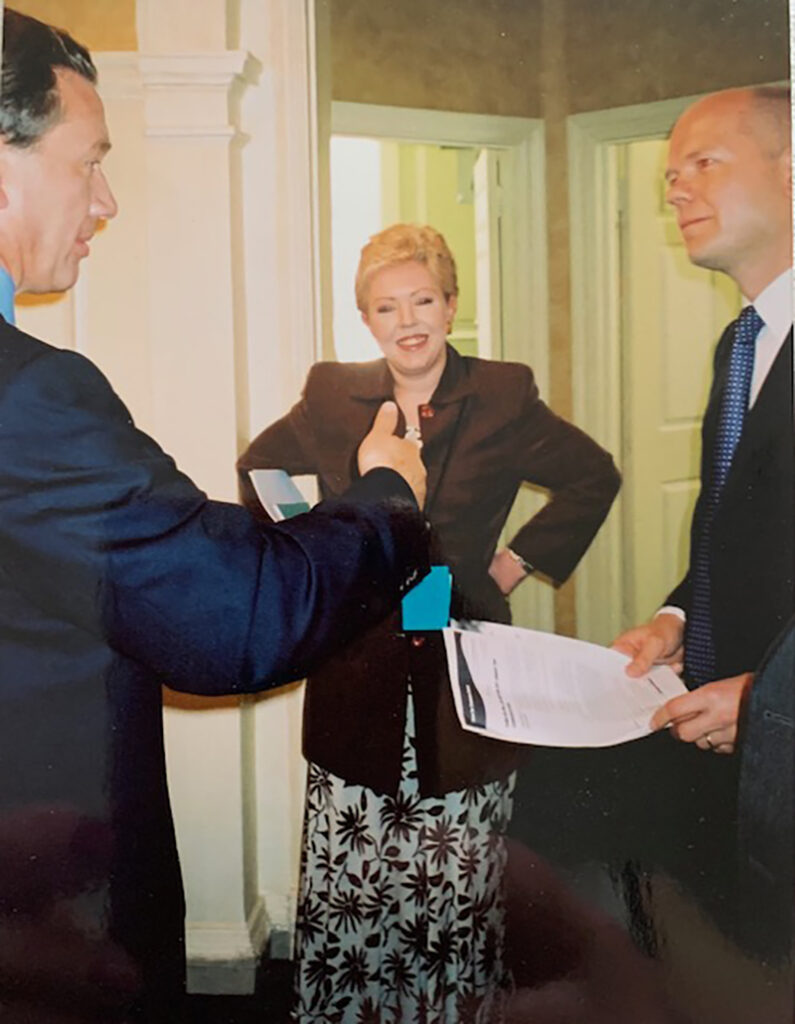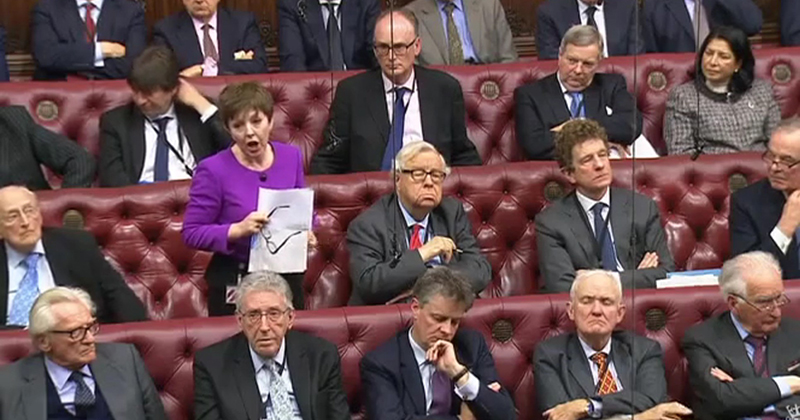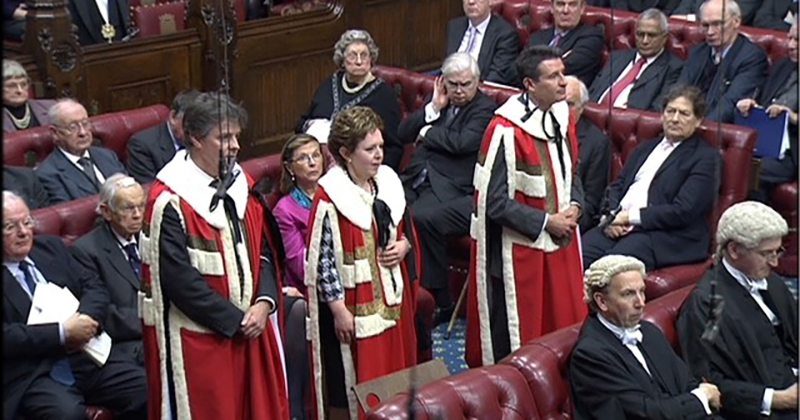Baroness Stowell is a born-and-bred FE college alumna from the Midlands who ended up leading the House of Lords. Now she’s calling for an end to the ‘disrespect’ of non-graduates
“I’ve spent a lot of time working in places where there are public crises and dramas. I’m not fazed by that, I don’t panic, I’ve seen it all before. It’s like bread and butter to me.”
Tina Stowell, or Baroness Stowell of Beeston (the Beeston in Nottinghamshire, not Leeds, she clarifies), is not exaggerating. She has seen it all before. She’s worked for RAF chiefs, in Washington when the Berlin Wall came down, under William Hague when the Conservatives were in their late 1990s crisis, and at the BBC during the Hutton Inquiry.
In that time, she has risen from a girl training to be a secretary in a further education college in the Midlands to being appointed the country’s Leader of the House of Lords. At one point, I just ask: how did she do it?
“I think it’s that I could make things happen. I could take charge of organising things, I was very good at building relationships and influencing people to be able to make things possible. I was like a mini-fixer.”

But while Stowell, who says her strength is “defining and redefining something down to its most simple point, to drive through change”, is comfortable in a major crisis, she is disturbed by a quieter crisis – an underlying trend rather than a front-page scandal. And education, she says, is at the heart of it.
It’s not a new argument: the country, and the western world, is increasingly divided along lines of educational attainment, rather than the old categories of class. The phenomenon is behind big fallouts over things like Brexit and Donald Trump.
But Stowell is perhaps unusual in having bothered to personally pen a paper, published last month with the Social Market Foundation, in which she “defines and redefines” the issue to make sense of it.
That’s how she came to FE Week’s attention: her report calls for an end to “disrespect” for non-graduates, once and for all. She explains.
“The education divide is showing up as a proxy for something else, and that’s the lack of respect for the people who sit on one side of that divide,” Stowell begins.
“What’s happened is over time, most people in positions of responsibility or leadership are graduates. These decision-makers among us then tend to define success in their own image. And they tend to think that the best way of serving everyone else is to encourage people along the same path as themselves.”
Stowell leans forward. “And that has led them to concentrate on academic qualifications as the main kind of credential that determines whether someone is worthy of respect or not.” She raises her eyebrows. “They don’t do it deliberately.”
This has several consequences. First, the longer people have been going to university, “the more that degrees have become seemingly the only currency that allows you to travel”. The government is arguably hoping to change this, with its focus on technical education reform through T Levels, degree apprenticeships and the wider Skills Bill proposals, including a lifelong loan entitlement.
But “ramping up” further education is not a sure-fire solution, Stowell warns in her paper.
It will “only assist in bridging the educational divide if it is not seen as a consolation prize for those who do not go to universities”.
Second, among the older generation are “successful people without degrees who can feel quite frustrated that their contribution is not understood”.

Stowell knows this all too well, as someone who got to the top with a vocational qualification from an FE college. Her father was a painter and decorator, her mum worked in a factory, and Stowell was brought up believing in work.
“I wanted to be a grown up, and work was grown up. I was in a family where work was talked about a lot. You put work first, you worked hard, you never turned down overtime.”
At the end of school, which Stowell persisted at but didn’t love, she set her sights on a prestigious secretarial course at college. “I wanted to be a hot-shot secretary!”
There was no sense this was a sub-par choice over university, she continues. “Those who went to university had always been known as the brainy ones. For those who went to college like I did, that was something to be proud of.”
Stowell was the only girl from her school year accepted on to the course, where she studied for the London Chamber of Commerce and Industry private secretary certificate. “I thought college was fantastic. It was because it felt different to school. The lecturers treated us like adults.”
From there, Stowell’s career took off. But not many other secretaries are making speeches in the Lords now. Stowell’s vocational qualifications gave her a leg up – she became private secretary to an RAF commodore and then got a job in Washington through the Ministry of Defence – but her attitude built her career. Or, as she calls it, “standards”.

“People like to talk about values, but they shy away from the word ‘standards’. However, values can be quite nebulous: be kind. Who doesn’t agree with being kind?
“But standards are more specific. The reason they are so critical is they allow us to judge behaviour. The only way we can judge someone’s motives is through their behaviour. You can’t judge what’s really in someone’s mind.”
Stowell’s point is that by adhering to certain standards of behaviour, people can trust one another. “Standards like punctuality and working hard, they are an exercise in self-discipline, and they force us to show respect to someone else, and that cultivates a mutual understanding.”
To illustrate her point, Stowell describes returning from Washington to a job as Number 10’s press secretary’s assistant. She soon oversaw the travelling press parties overseas and was an important contact for lobby journalists.
After a break from politics, she returned to work for William Hague, with Sebastian Coe as chief of staff and George Osborne as political secretary. There she was, surrounded by graduates from vastly different backgrounds to her own.
The reason someone like me has progressed is the fact I have brought to my work my commitment and standards
But if Stowell’s preoccupation is what divides people, then her solution is these standards. “The reason someone like me has progressed is the fact I have brought to my work my commitment and standards. These have been reciprocated to me by people who have been educated in a different way, and gone through a different system.
“We’ve seen and recognised in each other common standards, which has made it possible to trust each other and form serious bonds.” It’s a powerful argument.
Finding common standards is how Stowell works. After standing unsuccessfully to be selected as an MP in 2009, she was appointed by David Cameron to the Lords, from where she guided the Marriage (Same Sex Couples) Act 2013 through the House.
She did so by “telling the doubters it was OK to be doubtful”. The argument became less divisive and more were inclined to back the bill, she says. By 2014, she was Leader of the House.
Her other superpower is articulating the problem in hand. Take this one: reform of the Lords. “The purpose of the House of Lords is to complement the House of Commons by working in a different way […] less combative, more thoughtful, less political.” But this is changing with the move away from hereditary peers towards directly appointed peers instead, says Stowell.
“I don’t think the House of Lords is adding as much value as it might have done in the past, because it’s becoming increasingly, in its practices and its methods, more like the House of Commons.” Successive prime ministers have appointed people to get legislation through, so there are more former MPs, she explains.
“So they’re continuing what they were doing in the Commons.” There is a real danger people will “legitimately” ask what the point of the Lords is, she warns.

In terms of solutions, Stowell says she favours a more elected model, but she doesn’t have a blueprint.
However, she does have solutions for the educational divide.
Everyone has “got to see FE as a route to leadership and positions of authority. It’s really important we see people who go down that path as potential leaders themselves.”
Meanwhile, employers should stop valuing a university degree over the “standards” a person displays. “Too many entry-level jobs seem to value a university degree for no good reason. Beyond qualifications there are social norms or standards, and these are things we ought to recognise.”
But here the rub. Does Stowell realise that having these “standards” (self-efficacy, self-discipline and self-belief, often arising from a stable home life) is itself a dividing line? How do we help the people whose lives are too chaotic, or too traumatic, to learn such standards?
We know the long-term solutions for changing behaviour (high-quality social workers, coaches and therapy) are expensive.
“I don’t know if there’s a structural answer to that question, but today’s leaders have a responsibility to demonstrate and promote those standards, to argue for them and to back people who uphold them.”
It’s not an evasion, but there are many college staff working with the most vulnerable who would say such a solution is really not sufficient.
Nevertheless, Stowell makes a powerful case, when others have given up ̶ or wouldn’t express it half so clearly, or bravely.









Your thoughts